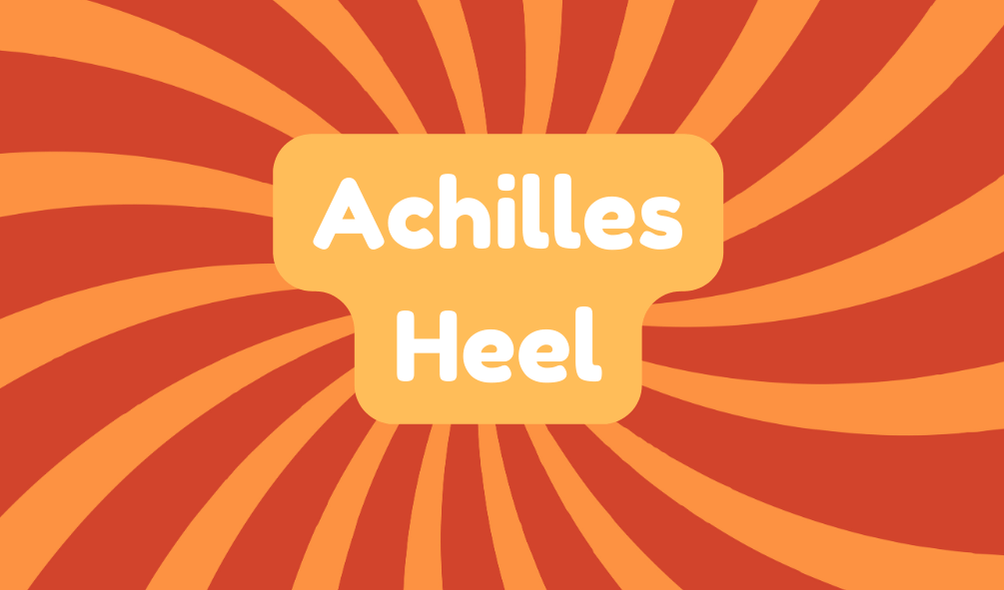The term "Achilles heel" refers to a significant weakness in an otherwise strong individual or system. Originating from Greek mythology, where the hero Achilles was invulnerable except for his heels, it highlights how minor flaws can lead to major failures. For example, a leader's inability to delegate effectively can cause project delays. This concept remains relevant today, as recognizing weaknesses is essential for both personal growth and organizational resilience. More insights on this topic await further exploration.
Synonyms
When discussing the concept of an "Achilles heel," it becomes essential to acknowledge the various synonyms that convey similar meanings. Terms like "weakness," "vulnerability," and "flaw" encapsulate the essence of minor flaws that can lead to larger failures. These words reflect critical vulnerability factors in both individuals and systems, exposing hidden weaknesses that often go unnoticed.
- Minor cracks in an otherwise solid structure
- A chink in the armor of a mighty warrior
- The unexpected fault line in a well-built strategy
Recognizing these synonyms helps illuminate the importance of addressing seemingly insignificant weaknesses before they escalate into substantial problems.
Example of Sentences
Understanding the concept of an "Achilles heel" can provide valuable insights into both personal and systemic vulnerabilities. Familiarity with various Achilles heel examples reveals how seemingly insignificant flaws can lead to significant consequences:
- A talented musician's stage fright undermines their performances.
- An innovative startup's looped supply chain results in constant delays.
- A leader's inability to delegate tasks causes project bottlenecks.
Conducting a vulnerability analysis of individuals and organizations highlights these critical weak points. By recognizing these Achilles heels, one can prepare more effectively against potential failures, demonstrating that strength and weakness are often two sides of the same coin, deserving careful examination.
Origin
The origin of the phrase "Achilles heel" is steeped in Greek mythology, where the legendary hero Achilles embodies both extraordinary strength and a critical vulnerability. According to myth, Achilles was dipped in the river Styx to gain invulnerability, yet his heels were left unprotected, ultimately leading to his demise by a single arrow. This historical significance reveals how even the mightiest can possess a fatal flaw. The term entered the English language in the 19th century, highlighting society's fascination with identifying weaknesses in otherwise strong individuals or systems, serving as a cautionary reminder of the delicate balance between strength and vulnerability.
Collocations
Collocations related to the term "Achilles heel" can reveal much about how individuals and systems identify their weaknesses. By examining language, one finds recurring themes that highlight vulnerable spots and critical weaknesses.
- Personal Achilles heels in character
- Organizational Achilles heels in strategies
- Societal Achilles heels in governance
These collocations demonstrate how subtly pervasive such weaknesses can be. Recognizing these associations invites a more critical perspective on one's strengths, encouraging an innovative approach to fortifying defenses. Embracing vulnerability can lead to transformative growth, as confronting these weaknesses often acts as a catalyst for progress, ultimately reshaping how challenges are navigated.
How to Use in Everyday Language
In everyday language, "Achilles heel" frequently serves as a metaphorical tool to denote a person's or system's inherent weaknesses. Individuals often use this phrase when discussing personal vulnerabilities, aiming to illustrate flaws that may lead to failure. Identifying weaknesses in oneself or a team can provide valuable self-awareness but also exposes the risk of complacency. For example, in a competitive atmosphere, acknowledging an Achilles heel might spur innovation, yet it may also evoke skepticism about one's overall capability. Consequently, while the term offers insight into potential pitfalls, it encourages a realistic look at challenges one must confront.
Why Is It Still Relevant Today?
Recognizing personal or systemic weaknesses remains pertinent in today's fast-paced world. In an era marked by rapid change and disruption, the concept of the Achilles heel continues to hold significant cultural value. Modern applications span diverse fields, from business strategies to personal development, highlighting the necessity of vulnerability awareness. Organizations thrive by identifying their weaknesses, ensuring innovation remains resilient amidst challenges. This relevance serves as a critical reminder that even the strongest systems have flaws; acknowledging them paves the way for improvement. Ultimately, recognizing Achilles heels fosters growth and adaptability, essential traits for navigating contemporary complexities.







